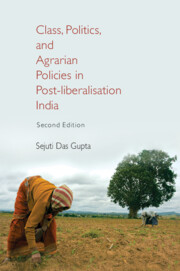
- Publisher:
- Cambridge University Press
- Online publication date:
- April 2024
- Print publication year:
- 2024
- Online ISBN:
- 9781009481328
Our systems are now restored following recent technical disruption, and we’re working hard to catch up on publishing. We apologise for the inconvenience caused. Find out more: https://www.cambridge.org/universitypress/about-us/news-and-blogs/cambridge-university-press-publishing-update-following-technical-disruption

Has there been a shift in agrarian policies in India since liberalisation? What has been the impact of these policies on new class formation and consolidation of existing ones? Did proprietary classes with close relations to the state influence the formulation of these policies? Do class–state relations have to be uniform across nations under globalisation? Studying post-liberalisation India, this book answers these questions by scrutinising the tenets of agrarian policies of three Indian states – Chhattisgarh, Gujarat, and Karnataka. In doing so, it analyses the political economy of agricultural policy and the class–state relations operating in the country concluding that class and its relation to the state have come to occupy a defining role in the politics of new India. This edition has an all-new introduction and conclusion that considers the farmer movements in 2020-21 and how that impacts agrarian class structure and role of the state.
‘An important book that combines class analysis with subnational analysis to understand the changing nature of state-class and political economy of India in the context of ongoing globalization and economic change. In the process we are able to locate ongoing inequalities with a powerful framework and place both global and domestic change alongside agrarian crises and problems. The framework outlined in the book updates the nature of state since 2004 and how caste power also enhances class power, creating a political settlement and bargain between fractions of classes and the changing nature of the state. It is a book worth reading and digesting both for its empirical analysis of agrarian class relations across Chhattisgarh, Gujarat and Karnataka and for the notions of state-class relations, structure, and political settlement that it advances.’
Aseema Sinha - Claremont McKenna College, USA
‘This provocative study of agrarian politics in post-liberalization India illuminates the relevance of class analysis for understanding India’s agricultural policies. Its detailed study of three Indian states – Gujarat, Chhattisgarh, and Karnataka – provides a fascinating account of India’s ongoing rural transformation, especially the causes of its growing inequality. This important book offers valuable insights for all interested in the sources of change in India’s rural political economy.’
John Echeverri-Gent - University of Virginia
‘A much-needed volume that provides a comprehensive analysis of agrarian transformation and the effects of state policies on class fractions and the agrarian capitalist class in particular in post-liberalization India. The updated version focuses on this and much more; highlighting the diversification of agrarian classes and the increasing opportunities for accumulation for proprietary classes. This well-informed and empirically grounded book is a must read for all those who want to understand emerging relations between class and state, new processes of wealth accretion, intensification of inequalities in India and why globalization is not a great equalizer.’
Zoya Hasan - Jawaharlal Nehru University
'This book provides fresh and critical insights on the emerging relations between the agrarian classes and the state within the milieu of economic reforms over the past three decades. The intricate weaving of micro-field evidence with the macro-regulatory processes, meticulously undertaken, constitutes a valuable piece of scholarship that students of political economy will cherish.’
Arindam Banerjee - BML Munjal University
 Loading metrics...
Loading metrics...
* Views captured on Cambridge Core between #date#. This data will be updated every 24 hours.
Usage data cannot currently be displayed.